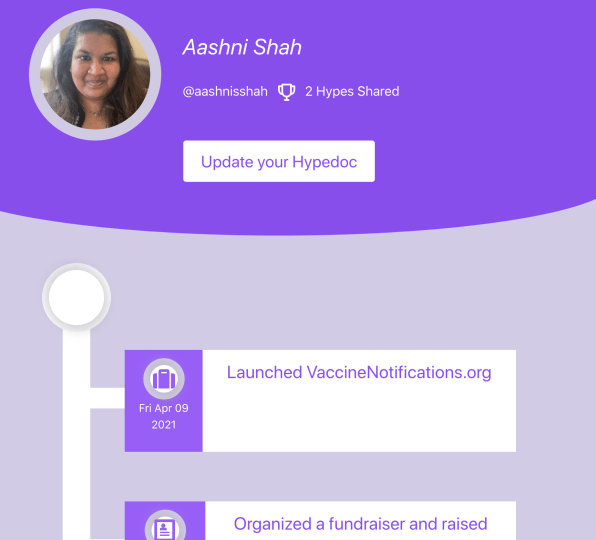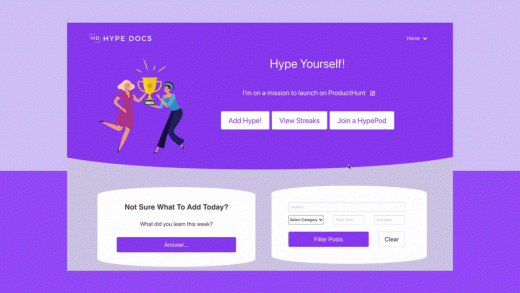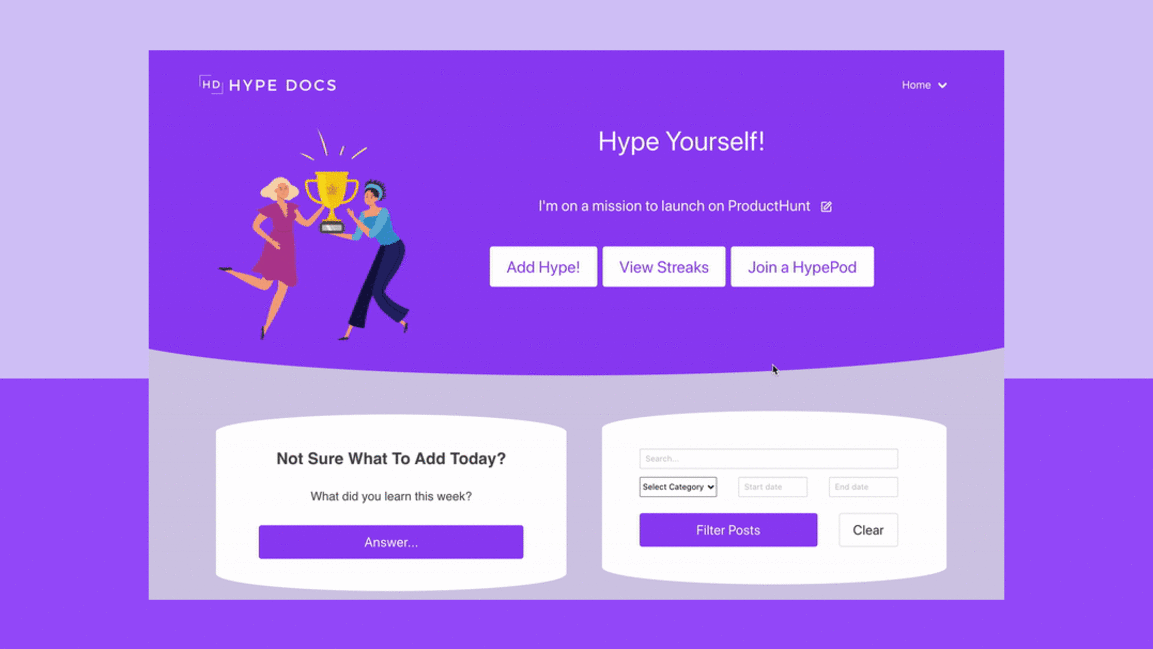HypeDocs helps you catalog your work wins so you can get that promotion
When Aashni Shah first showed up to work at Square a few years ago, she was in rough mental shape.
Despite a long list of accomplishments as a software engineer, Shah says that a racist and sexist manager at her previous job had ruined her confidence. She left that company (which she prefers not to name) feeling like a failure and withdrawing as a person.
Things started to change, however, when a colleague at Square introduced her to the concept of a “hype doc”: a place to write down and revisit her accomplishments. What began as a simple Google Doc turned into a spreadsheet, and what was once a solitary effort became a group activity, in which Shah and her work friends would log and discuss their milestones together.

[Photo: courtesy of HypeDocs]
“Starting a hype doc gave me back that confidence that I needed to start building things again, and taking ownership of the things that I’ve been building,” Shah says.
Shah, who left Square in late 2019 and is now an independent product creator, has since turned the concept into a website called HypeDocs. For $10 per month (with a two-month trial), HypeDocs sells self-esteem-as-a-service, letting people organize their accomplishments and get highlights delivered via email. Shah also sells a business version that companies can offer to their employees, and will soon launch public pages so users can share their milestones with others.
While HypeDocs is open to anyone, Shah says she built it with women and underrepresented people in mind, hoping they’ll use it to gain confidence, avoid imposter syndrome, and strive toward getting more raises and promotions.
“That’s the goal I want to achieve . . . to help women and underrepresented folks find their voice so they can get what they deserve,” she says.
Hype yourself (when no one else will)
The idea of logging your accomplishments over time is hardly new. Job advice pros have long recommended creating a “career management document,” for instance, as a way to keep track of work experience.
Still, the concept of a “hype doc” or “brag document” seems to be gaining traction, especially in tech circles. Marie Chatfield, formerly a software engineer at Square, wrote about building a hype doc in early 2018. Software developer Julia Evans extolled the virtues of the brag document (and provided a template) in 2019. Last December, designer David Hoang referred to the hype doc as the “most important career doc for your manager, your peers, and you.”
As Chatfield wrote, the goal of the hype doc is not to exaggerate your accomplishments but to efficiently track the work that you might use to justify a raise or promotion. It’s also a way to sharpen your mission and goals, as Evans noted.

HypeDocs is simply putting a new layer of polish on the idea, making it easier to organize and rediscover those accomplishments. Through the website, users can file achievements into separate categories for work or hobbies, set overarching goals for their achievements, and create a mission statement for why they’re doing the work in the first place. HypeDocs then delivers little confidence-boosting reminders over email.
Regina Gerbeaux, the head of fellowship operations for the talent accelerator On Deck, where Shah became a fellow after leaving Square, says those reminders make a big difference compared to keeping a static journal. (She also says using HypeDocs helped her get promoted three times in five months at On Deck, where she started as an intern.)
“It’s so easy at the end of the day to forget the stuff you did right and just focus on the stuff you got wrong,” Gerbeaux says. “Reminders are amazing.”
Nicole Caba, founder of the moving assistance app Avvinue, says she was drawn to HypeDocs after relocating from New York to France. She had been filing her achievements related to the move in a Word document, and stumbled upon HypeDocs in a thread about startups on Twitter. She quickly became an enthusiastic user.
“Encouraging positive reinforcement is important in anyone’s life,” she says. “If you don’t have someone who’s always giving that positive reinforcement, that’s where HypeDocs steps in.”
Spreading the hype around
While HypeDocs originally launched as a tool for individuals, lately Shah has started selling it to businesses. The enterprise version of HypeDocs includes Slack integration and a dashboard for companies to add or remove team members; Shah also holds workshops for companies to help them get more out of the tool.
The hope is that employees will have an easier time communicating with managers who may not be paying close attention. Shah says that’s especially important for women and members of minority groups, who don’t get promoted as often as they should.
“We don’t get the ability or the visibility or the credit for the work that we do. That makes us pretty upset and pissed off, and we’ll leave. Or we just end up working ridiculous hours,” she says. “I want to flip that narrative.”
But even as enterprise use becomes a bigger focus, HypeDocs is still adding features for individuals. Shah is launching public HypeDocs next week, letting users share their accomplishments if they opt into the feature. In a way, she says, it’s “almost like a more personalized LinkedIn.”
Not entirely, though. Unlike social networks—and some employee performance-tracking tools such as Karma—shared HypeDocs pages won’t have likes or comments. Shah says she’s not interested in that kind of system because it ultimately turns personal and professional achievements into a popularity contest.
“I don’t want you to focus on posting so you can get as many likes as you want,” she says. “This is not Instagram.”
(41)



